Any opinions
-
This post is deleted! -
@herenow said in Any opinions on blood glucose spikes. Be afraid or nonsense?:
Do you worry?
Hi,
Context is all.
Otherwise, useless to debate. -
This post is deleted! -
@herenow said in Any opinions on large blood glucose spikes beyond 140. Be afraid or nonsense?:
You're right. I'm thinking in terms of large spikes to over 140-150. I'll need to clarify.
Give examples of 2 usual breakfast and midday meals (4x), with proportions.
Hb1Ac measures ? -
This post is deleted! -
@herenow talking generally for glucose tolerance i think 150 could still be a healthy response for high carb low protein meal but depends when youre measuring it, if youre measuring it at 30 mins - 45 mins when it usually peaks. 180+ = not well adapted, i think if youre > or at 150 still at an hour after eating theres a problem with insulin or high fats in blood. in diabetes they target under 160 https://chrismasterjohnphd.substack.com/p/self-experiments-in-the-biochemically
when he adapted he didnt get >150 anymore
But if thats happening with good amount of protein then its a different story, protein can lower blood sugar response to carbs a lot if in right ratio. so could show dysfunction. -
@herenow said in Any opinions on postprandial blood glucose spikes beyond 140. Should people worry?:
Do you worry?
The why anyone should allegedly worry is of interest. Allegedly it interferes with osmoregulation, which is a relative phenomenon.
@herenow said in Any opinions on postprandial blood glucose spikes beyond 140. Should people worry?:
I'd have to gorge on pasta
"Salty as the sea" and it probably won't happen.
-
@herenow said in Any opinions on postprandial blood glucose spikes beyond 140. Should people worry?:
I assume it can cause damage but everything does.
If you do so for some time, you'll lose control of your liver hormones. Insensibility of muscles. DT2 and later DT3 (brain).
The way your body is going to response after ingestion of 50 g glucose, aka the AUC at 140 or 170, after 45’ till 90 / 120’, will depend on several things.- The way you deal with the breakfast spike. Impact on the whole day.
- The order of food ingestion: fiber first, meat and fat afterwards, carbs at the end of the meal.
- The repartition between glucose and fructose (50/50 optimal).
- The kind of carbs (see picture)
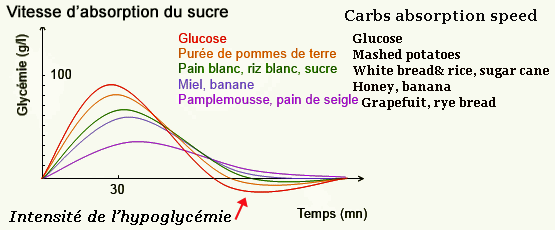
Mid & long term impact: - The reaction of the liver will be fragile if you don’t get enough potassium and biotin. You’ll get more lactic acid if you eat refined carbs without enough B1. Interaction with other B too.
- If your liver can’t manage the amount of fat taken or released (stress), you’ll be unable to manage carbs well. And when drinking wine or beer, the first priority is to get rid of ethanol.
-
This post is deleted! -
This post is deleted! -
@herenow said in Any opinions on postprandial blood glucose spikes beyond 140. Should people worry?:
If it leads to hypoglycemia (as per your graph) then the question I would have is does that cause damage.
Does insulin yo-yoing affect our health?
Sorry but there is no single and easy answer. Shortly said: A bad result for HbA1c will induce a fatty liver and altered arteries if you don't correct it and don't try to get better enhanced results from the blood test.Insulin Spike
Insulin modulates the level of IGF-1, one of the growth factors that instructs cells to divide, proliferate, and evolve to build tissues. The more abundant the food, the more insulin there is, and the more IGF-1 is available to activate the body's growth...
How does insulin affect IGF-1?
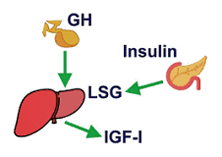
Insulin increases liver GHR expression, making the liver more GH-sensitive, leading to an increase in IGF-1 and a decrease in GH.
GH = Growth hormone
IGF-1 = Insulin growth factor 1
GHR = Growth hormone receptor
LGH = Liver growth hormone=> Excess stimulation of GH induces a fatty liver and insulin resistance
Interplay between Growth Hormone, Insulin-Like Growth Factor-1, and Insulin
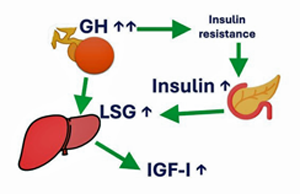
High portal insulin concentrations significantly increase liver sensitivity for growth hormone (LSG). This only makes the situation worse, as the high GH levels only further increase the already elevated insulin-like growth factor-1 (IGF-1)
Source: DOI: https://doi.org/10.3803/EnM.2024.101 The Fascinating Interplay between Growth Hormone, Insulin-Like Growth Factor-1, and Insulin – Endocrinology and Metabolism 2024. Eline C. Nijenhuis-Noort et al.
=> GH activates GH receptors (GHRs), which activate IGF-1 in the liver through a cascade of processes [6].
Insulin modulates the biological actions of GH by controlling the expression of human hepatic GHRs [8].
Metabolically, GH promotes anabolic action in most tissues except adipose, where its catabolic action causes the breakdown of stored triglycerides into free fatty acids (FFA).HbA1c
To assess the state of your arteries, we often refer to measuring glycated hemoglobin (HbA1c) during a blood test. This indicates the state / level of impairment induced by arterial oxidation (an indirect result with a most likely outcome).
The normal glycated hemoglobin level is between 4.1 and 5.4% in non-diabetics. It indicates the average blood sugar level over the past 2 to 3 months. A level above 5.4% may be associated with a relative risk of developing coronary artery disease or a stroke.
A level of 6 is a critical threshold. A level of 7 is considered pathological/critical for diabetes. I started to worry about it around 5 so I could more easily correct the situation.
A level of 4 is often observed around age 40, 5 at age 50, and 6 at age 60.
Figure 3: Sugar level in blood (HbA1c)

Outcome
Except a possible counter effect of a reactive hypoglycemia, we’ll have to manage long term effects, aka insensibility of the process when too much and inappropriately used. Insulin is useful as long you don’t overuse it, and in an appropriate way.
Figure 4: Insulin resistance
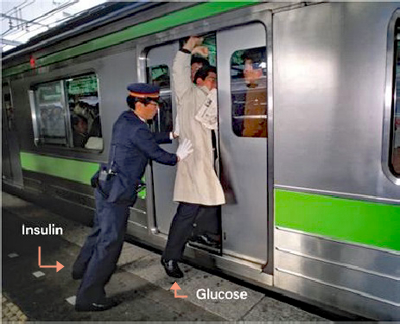
When overuse of insulin, this delayed outcome happens: Difficulty to use glucose. More insulin will be required to do the same job.Figure 5: Impact of insulin resistance
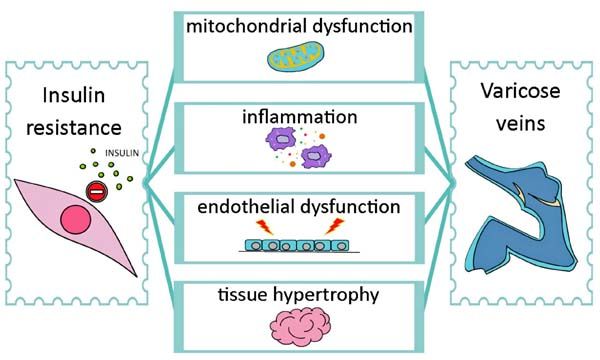
Credit: 10.20517/2574-1209.2024.26 Varicose vein disease in the context of insulin resistance
Abstract
The prevalence of insulin resistance (IR) is growing every year, which determines the risks of developing type 2 diabetes and cardiovascular diseases. Currently, IR is not recognized as a risk factor for the development of varicose veins (VVs), but the connection between the two is tacitly obvious because obesity and diabetes are risk factors for VVs. In this review, we have attempted to highlight the common nature of these two conditions in the context of mitochondrial dysfunction, inflammation, endothelial dysfunction, and tissue hypertrophy, and spotlight the role of IR in the development of VVs. We conclude that IR can contribute to the appearance of VVs. -
This post is deleted! -
@herenow said in Any opinions on postprandial blood glucose spikes beyond 140. Should people worry?:
And beans are better than potatoes and meat is better than beans
Rather right but I won't formulate it so. Why?
There are the 3 macro-nutrients (LPG) in beans. Fine but in beans we have anti-protease, like in every bean / nut / seed. So to be taken into account. Not 2 consecutive days for me when eating white beans with a tomato sauce.
Meat alone is going to excite insulin secretion. need a little carbs. A salad with a tomato is fine. Not much sugar is required.
When I eat potatoes, I put butter and one egg yolk in my puree.
or I mix 2 potatoes roughly with butter and veggies to slow down the assimilation. I cut my broccoli into small pieces. No need to cook broccoli for a long time. +/ 5 to 10' in my pan with one onion and coconut oil. Butter added at the end.
NB: No broccoli every day. It's going to give cyanates. If you combine with a pear or some berries + pseudo-bread (millet / manioc), it's hard work for thyroid (inhibition). -
This post is deleted! -
@herenow said in Any opinions on postprandial blood glucose spikes beyond 140. Should people worry?:
What would be the theoretical issue with dividing up your food into many small meals which would then negate the need to carefully formulate larger meals?
If you do so, on a usual way, you're going to loose MMC (postprandial evacuation). Risk for stagnation when eating a fatty meal. Too long then for a short break (3 H).
But if you do so (short meal of 1/5th total calories + an evening drink before bed, it could be OK if you can listen to your body response. Eat when you're hungry but not always the same macronutrients.
breakfast: 2 fruits + Greek cheese or 1 slice gouda or ham (50 g or 2 oz.)
Mind E250-255 (sulfites) when combining smoked cuts (or added E250) with fat and acidity (orange or pineapple). Not a problem if one shot, not as usual take (=>nitrosamines enhance DT3 and cancer issue)
doi: 10.1186/1750-1326-4-54
NB: Only when repetitive.
Collation: a green soup with 1 tsp coconut oil + one orange or a banana or ...
Midday meal (1 PM): free if you work / school. Begin with a salad carrot and apple and apple vinegar.
For 2 days: 3 or 4 carrots, one apple, and lemon juice or apple vinegar (bio) to taste.
Only once a day (chelation).
5 PM collation: collation. free (200 - 300 K/cal). or A shake to get an acid-base balance.
=> K Mg taurine + collagen 1 or 2 tsp if you don't eat cuts or bone broth (glycine).
I can give a link for receipts.
Evening meal (19.30'): carbs (55 g / 2 oz. rice / 85 -100 g pasta / 2 potatoes / 1 sweet potato)+ fat (coconut oil and or butter). Personally, I use coconut milk 100 ml / 3.5 oz. to vary. Mind additive (no agar, 5% guar gum tolerated).
I often add 2 big slices of breast duck, cut in small pieces. 4 x 2 slices = 4 meals.
Bedtime: if required, I modulate my acid-base balance, one hour before going to bed. Shake. -
This post is deleted! -
@herenow said in Any opinions on postprandial blood glucose spikes beyond 140. Should people worry?:
which has caused digestive problems.
Begin to manage this problem first.
enzymes to digest fat. mind the kind. See enzymedica lipogold on iherb.com.
Hcl betaine if you got problem for meat digestion (bile problem). once a day.
No legume.
Rule of 1/5 or 5/1 (20 % of meat when eating carbs (pasta / rice / potato).
Breakfast with carbs: the two same fruits until you digest well + 1 tsp coconut oil.
No banana except if it's very ripe / has already black spots (glucose then). -
This post is deleted!